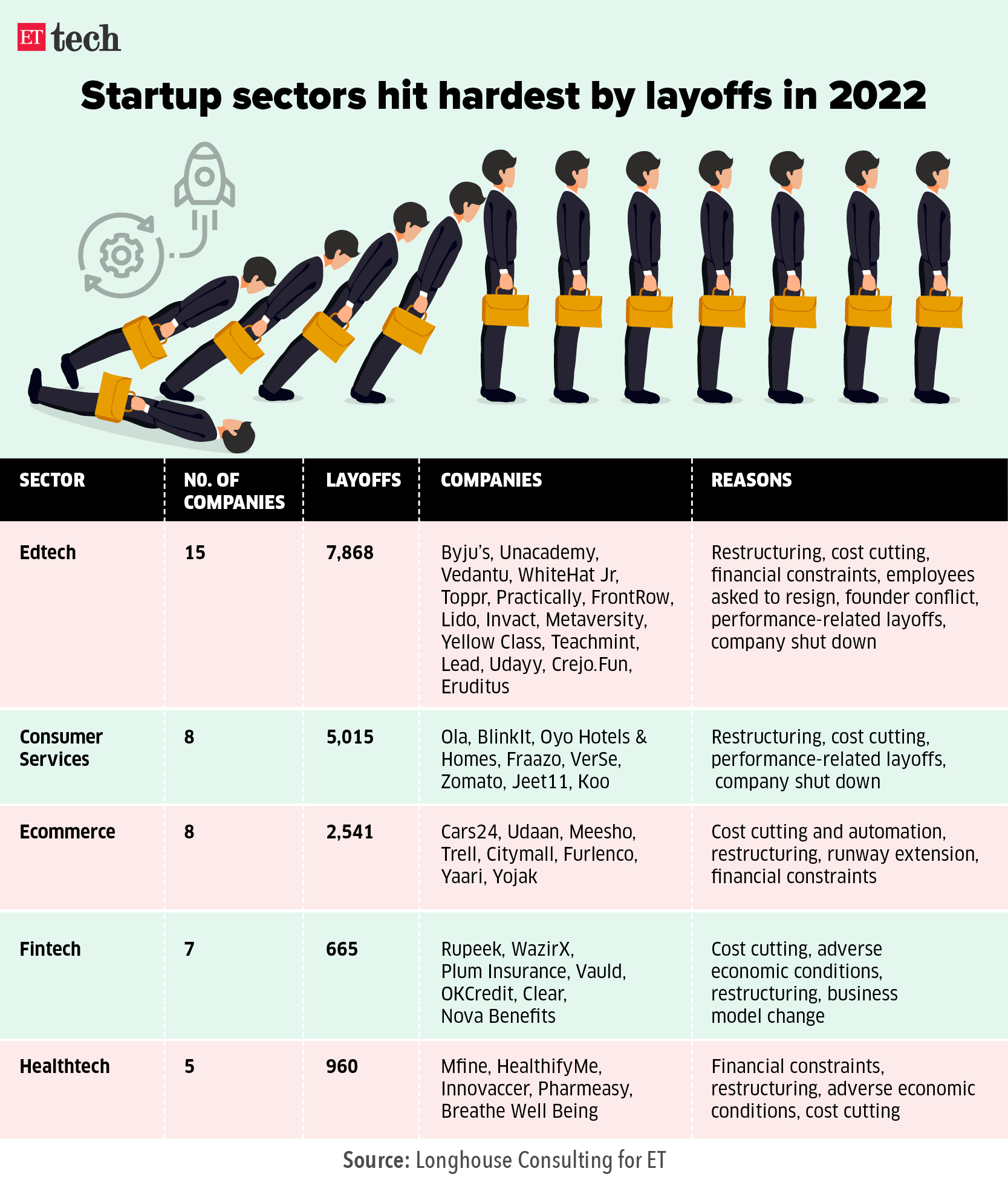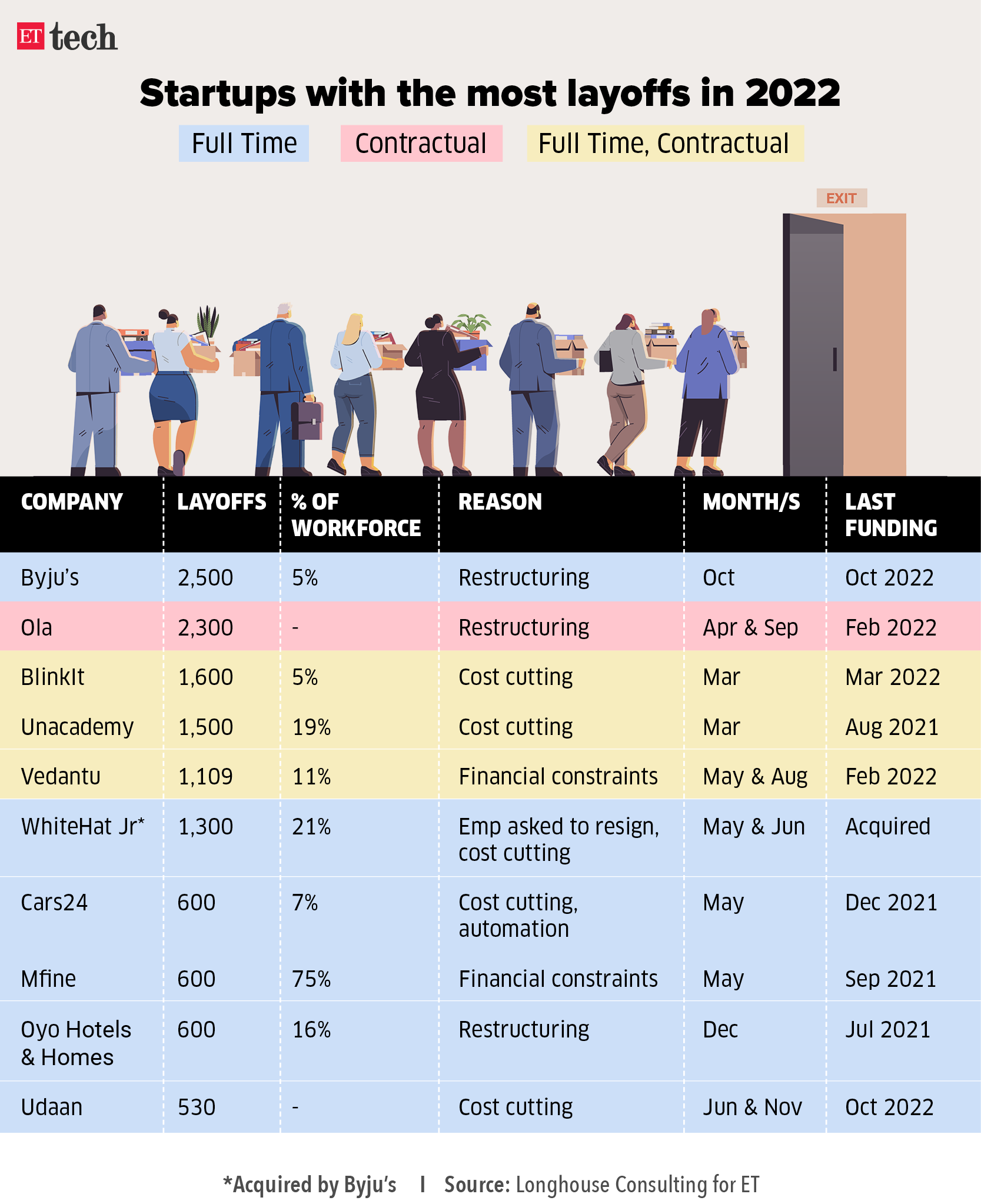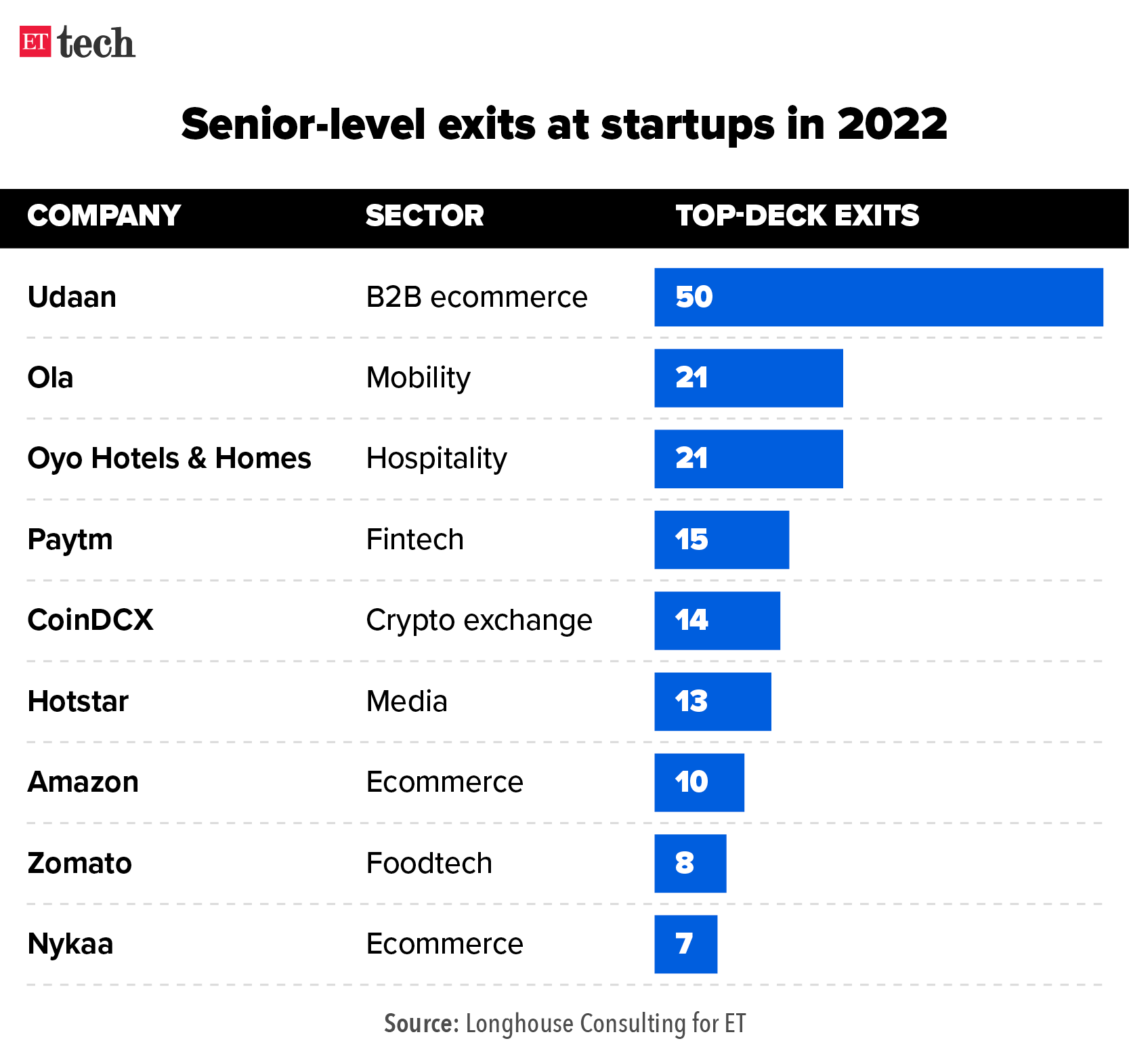[ad_1]
Also in this letter:
■ Udaan, Ola, Oyo saw the most senior-level exits in 2022
■ Startups, tech firms upskill blue-collar workers for larger roles
■ Govt looks to clamp down on dubious ecommerce practices
Startups laid off almost 18,000 employees this year

The ongoing funding winter and business challenges faced by new-age companies have resulted in nearly 18,000 job cuts so far this year, according to data compiled by executive search firm Longhouse Consulting and shared exclusively with ET.
By the numbers: In total, 52 startups fired 17,989 employees spread across edtech, consumer services, ecommerce, health tech, logistics, fintech, enterprise tech, media and entertainment, agri-tech and cleantech.

Edtech hit hardest: About 44% of the layoffs were at just 15 edtech companies – Byju’s, Unacademy, Vedantu, Byju’s-owned WhiteHat Jr and Toppr, Practically, FrontRow, Lido, Invact Metaversity, Yellow Class, Teachmint, Lead, Udayy, Crejo.Fun and Eruditus.
“Edtech players thought that everything will continue to be digital with Covid-19 getting over. They underestimated the power of the physical. Second, they didn’t really solve for great learning experiences. Third, they did not use the money wisely to do a blended product of what was called a physical education,” Anshuman Das, managing partner at Longhouse Consulting, told us.
Others: SoftBank-backed Ola fired 2,300 contractual employees in 2022. Most of these layoffs were at the company’s call centre department, a source told us.
Startups like Cars24, Meesho, Clear (formerly ClearTax), Furlenco, Oyo Hotels & Homes, and others also fired employees in 2022.

Trendspotting: During the first part of the year, most layoffs were concentrated on non-tech roles such as operations, academic and feet-on-street sales. But of late, a lot of the tech-focussed employees at startups such as Swiggy and Ola have also been let go, Das said.
Udaan, Ola, Oyo saw the most senior-level exits in 2022

Udaan saw the most senior-level exits of any company across India’s tech and startup ecosystem this year. It was followed by Ola and Oyo Hotels & Homes, according to data shared with us by Longhouse Consulting.
Udaan’s clipped wings: At least 50 top executives – ranging from C-suite to category and business heads – left Udaan in 2022, as the company grappled with funding and business-model issues, even as two of its founders stepped back from active roles over the course of the year.
To streamline its business, Udaan executed multiple rounds of layoffs throughout the year, with an estimated 1,000 employees sacked in all, as we reported on November 4.

Ola’s revolving door: Ola saw 21 exits of key executives in a tumultuous year, during which it shut down several businesses including grocery, food and used cars as attempts to build a super app failed.
The company has let go of around 1,000 employees, we reported on July 29, as it focused on the core ride-hailing business and scaled up manufacturing of electric vehicles (EV).
Oyo’s stalled IPO: Oyo Hotels & Homes also saw the exits of 21 key executives. Its much-talked-about IPO plans are yet to materialise after a tough year for tech stocks.
The SoftBank-backed startup saw Rohit Kapoor – who was its CEO for India and Southeast Asia business till April this year – leave to join Swiggy as CEO for its food delivery business.
Startups, tech firms upskill blue-collar workers for larger roles

Startups and tech firms are ramping up their focus on training and upskilling frontline workers not just to help them to work more efficiently but also to broaden their career paths.
What’s going on? Companies like Flipkart, Swiggy, Licious, Shadowfax, Urban Company and Daalchini Technologies are rolling out training programmes, skilling academies and partnerships with edtech firms to upskill delivery executives.
In a Microsoft Work Trend Index report launched earlier this year, six in 10 frontline workers said they were worried they could lose their jobs if they didn’t adapt to new technologies.
Who’s doing what: Flipkart runs the FlipAhead talent development programme, focusing on the career progression of the company’s frontline workforce. It has also launched a Supply Chain Operations Academy to provide training to supply chain executives.
The company has trained and certified more than 2,000 delivery executives and is looking to train another 2,000 in the coming year.
In September, Swiggy rolled out a skills academy for building and honing skills in areas such as spoken English, time management, soft skills, computer use and personal finance. More than 81,500 delivery partners have registered so far.
Govt looks to clamp down on dubious ecommerce practices

Have you ever tried to buy something online only to notice, at the final checkout page, some extra item had been sneakily added into your cart? Or while booking an airline ticket you are told there are “only 2 seats left at this price” to create a sense of urgency and nudge you to make an immediate decision?
The dark arts: Known as dark patterns, these user interfaces are crafted to trick or manipulate users into making choices that are detrimental to their interests.
Most prevalent in advertising, dark patterns are used to entice consumers into buying a more expensive product, charge them more than what was initially disclosed, or drive choices based on fake or paid-for reviews.
Ecomm clampdown: Dark patterns are now becoming more prevalent in ecommerce, and the government is looking to frame regulations to curb their use. “Dark patterns are unfair trade practice and a cause of concern,” Rohit Kumar Singh, secretary, ministry of consumer affairs, said.
Tata Group transfers Cliq’s parent firm to Tata Digital

The Tata Group is transferring the holding of Tata UniStore, which owns and runs the fashion and luxury-focused ecommerce platform Tata Cliq, to Tata Digital as it looks to bolster its ecommerce business.
What this means: Tata Digital becomes the sole entity for all online shopping ventures of the Tatas, including Tata Neu, Big Basket and Croma.
Tata Industries and Trent were the joint owners of Tata UniStore, with the former owning 96.78% and the balance held by Trent. The group has valued Tata UniStore at Rs 750 crore and Tata Digital will be offering preference shares to Tata Industries and Trent as consideration for the acquisition of Tata UniStore, as per the filings.
Stiff competition: The Tata Group is competing with Amazon, Walmart-owned Flipkart and Myntra, and Reliance Industries in India’s ecommerce market. The group has big ambitions in this segment and is driving a price war with discounts in categories such as smartphones, electronics and fashion.
ET Ecommerce Index
We’ve launched three indices – ET Ecommerce, ET Ecommerce Profitable, and ET Ecommerce Non-Profitable – to track the performance of recently listed tech firms. Here’s how they’ve fared so far.
MeitY named nodal ministry for online gaming matters

The Ministry of Electronics & Information Technology (MeitY) has been appointed as the nodal ministry for online gaming, according to a gazette notification published on Tuesday.
Additionally, for e-sports as part of multi-sports events, the Department of Sports under the Ministry of Youth Affairs and Sports has been notified as the nodal department.
Gaming in the spotlight: The online gaming sector has been under the regulatory spotlight and the government has been working on formulating uniform rules for the industry.
Separately, the sector has also come under the lens of Indian tax authorities, with the Central Board of Indirect Taxes and Customs having sent notices to around half a dozen online gaming firms based in Malta, the UK and Gibraltar.
Awareness campaign: On Tuesday morning, we reported that the government, through the Ministry of Corporate Affairs’ Investor Protection and Education Fund (IPEF), was planning to launch an outreach campaign to create awareness about cryptocurrencies and online gaming.
Other Top Stories By Our Reporters

Banks’ tech spends to remain flat in 2023: The banking and financial services (BFS) sector is likely to drag down overall growth in tech spending next year, due to inflation, a slowdown in major geographies like the United States and Europe, and increased insourcing by financial institutions, experts said. The BFS segment will see flat to negative growth through most of 2023, said Phil Fersht, chief executive at IT research firm HfS.
Zoho’s rural-built helpdesk software surpasses a lakh customers: Zoho Desk, a help desk software product built from scratch at a remote office in Tenkasi in southern Tamil Nadu, has reached the milestone of 100,000 customers, including large customers from 16 countries, a senior executive told us.
Global Picks We Are Reading
■ Crypto bankruptcies chip away at customers’ anonymity (WSJ)
■ This was the year that electric vehicles took off (Wired)
■ Musk, Zuck, SBF: the lousiest tech bosses of 2022 – rated (The Guardian)
[ad_2]
Source link








